#Roman General Maximus Decimus Meridius
Text
The Third Day of Julius Caesar
What was Julius Caesar's *real name*?
People often think that Caesar's name is just Julius Caesar, nothing more nothing less. His first name is Julius and his last name is Caesar. And that makes sense in a culture in which Julius is a valid first name.
But was Julius a valid first name in the time of Julius Caesar?
Usually not!
Generally, Roman men at the time of Julius Caesar had to have at least two names, a praenomen and a nomen. A praenomen is like your first name, your given name. A nomen is like your family name, it showed which gens (your extended family) you belonged to, and it usually ended with an -ius (like Claudius, Valerius, Vipsanius, Vergilius, Flavius and... Julius!)
There was a third type of name, called a cognomen. It was like a legal nickname, or it could also be a name that showed which branch of your gens you belonged to. Not all Roman men had one (such as Marc Antony!), but many did, including Caesar.
Generally, the order was like so: praenomen, nomen, and cognomen (fun fact: Maximus Decimus Meridius probably should've been Decimus Meridius Maximus. But who can trust Gladiator to be accurate?).
So we know Caesar's nomen, Julius. And we know his cognomen, Caesar. Wait, what about his praenomen? He needs one!
Julius Caesar actually had three names; we just don't usually call him by his first name. His full name is Gaius Julius Caesar. His father's name was also Gaius Julius Caesar, and his father's, and his father's! (but Julius Caesar's great great grandfather's name was actually Sextus Julius Caesar)
So yeah, Julius was not Caesar's first name.
I've met a few people who say "Actually, no. Julius Caesar's *real name* was Caius Julius Caesar with a C instead of a G!"
Nope!
The reason we sometimes see Caius for Gaius (and why Gaius was abbreviated as C.) wasn't because Gaius was actually Caius or the ancient Romans pronounced Gaius like Caius. It's because in earlier Roman history, those poor guys didn't have the letter G! They had C, K, and Q (which all made the exact same sound) but they didn't have G. They had to spell Gaius with a C and they had to abbreviate Gaius with a C because they had no G.
This was because the Latin alphabet came from the Etruscan alphabet, and Estruscan didn't have a distinction between the C and G sounds and therefore they didn't need two separate letters. Latin, meanwhile, did have a distinction and did desperately need two letters.
Anyway, Romans later got the letter G and then they could write all your favorite G words, like Gay and Gaius. They still commonly abbreviated Gaius as C. because old habits die hard.
If you say that we should write Gaius as Caius because that's the original way to spell it, you might as well say we should write Gaius as CAIVS. Don't cherry pick your archaisms!
#dont cherry pick your archaisms#i like that#the 15 days of julius caesar#ancient rome#roman history#history#julius caesar#roman names#tria nomina#ides of march#the ides of march
113 notes
·
View notes
Note
Rpg Anon: I've been a bit relatively moody lately and that's why I haven't done the class 77 Personas research lately. I still intend on doing it but still. Regardless, mod, if you have the time, what Personas do you imagine Makoto's class to have?
We already established Sayaka to have Miss Crane/The Crane Wife and Sakura to have Hercules but any thoughts you have of everyone else? Class 78 so far has the themes of their Personas not particularly being gods but more characters of popular stories and folklore.
P.s. if you want to give Kyoko Sherlock Holmes than you're gonna have to justify it cuz that's a bit too easy and direct.
//Hey, so I'm really sorry I got late to this. I'm sorry you've had some rough days and I apologize for not getting to this sooner.
//And then when I tried to do it last night, my internet provider went down right in the middle of it, so that pissed me off as you might imagine.
//It just took me a while to think about it, but I do think I've got some answers. Note that I'm not completely sure about all of them, I decided a lot of these based on the theme of, as you said, popular stories and characters from folklore.
//I'll try my best to explain each one.
Makoto - Antar: Antarah ibn Shaddad al-Absi, also known as Antar, was a pre-Islamic African-Arab knight and poet, famous for both his poetry and his adventurous life. I'm very wishy-washy on this one, but ultimately I focused on the fact that he started out as a slave before he became a knight, channeling his hopes and dreams to reach where he got to.
Sayaka - The Crane Wife: For reasons we have already established. However, I do wish it had a better, or more official name.
Junko - Nyarlathotep: A fictional character created by H. P. Lovecraft. The character is a malign deity in the Cthulhu Mythos, a shared universe. First appearing in Lovecraft's 1920 prose poem "Nyarlathotep", he was later mentioned in other works by Lovecraft and by other writers. He is also the main antagonist of Persona 1 and 2, and was picked for reasons already established.
Hina - Maximus: Maximus Decimus Meridius was the commander of the Armies of the North and the Felix Legions under the Roman Empire. The greatest general of Rome during the 2nd century AD, he served loyally under Emperor Marcus Aurelius during his Twelve Year Campaign against the Germanic tribes at Vindobona in Germania. I picked this one because he's also the main character of the film Gladiator, a film about warrior sports, which fits Hina's sport related talent, her competitive nature, and her determination to see things through to the end. That said, this is by far the one I am the most unsure of, and wouldn't mind a second opinion.
Chihiro - Mulan: A legendary folk heroine from the Northern and Southern dynasties era of Chinese history. According to legend, Mulan took her aged father's place in the conscription for the army by disguising herself as a man. While I do think there could be alternatives, I ultimate focused on the similarity between Mulan and Chihiro's stories, where they disguise themselves as the opposite gender. Mulan does so to protect others while Chihiro did to protect himself, but ultimate came into his own to embrace his identity.
Sakura - Hercules: For reasons established. The strongest man in history serving as the Persona of the strongest woman in the world.
Toko - Maleficent: In PToH Toko obviously has Barrow, but that's more to fit with Komaru and them being a duo. In an alternative world, this Persona is based on a fictional character who appears as the main antagonist in Walt Disney Productions' 16th animated feature film, Sleeping Beauty (1959). She is represented as an evil fairy and the self-proclaimed "Mistress of All Evil" who, after not being invited to a christening, curses the infant Princess Aurora to "prick her finger on the spindle of a spinning wheel and die" before the sun sets on Aurora's sixteenth birthday. However, more recent iterations of her character, such as her 2014 standalone movie puts the character into a much different light, revealing that she was once a kind-hearted fairy, who is deceived by the love of her life, Stefan; Aurora's father, and she places a curse on her in order to exact revenge. This is similar to how Toko spent a lot of her young childhood being kicked down, manipulated, hurt and betrayed by everyone, which led to the birth of her vengeful and psychotic alter ego, Genocide Jack.
Celeste - Jeanne d'Arc: A patron saint of France, honored as a defender of the French nation for her role in the siege of Orléans and her insistence on the coronation of Charles VII of France during the Hundred Years' War. Claiming to be acting under divine guidance, she became a military leader who transcended gender roles and gained recognition as a savior of France. Celeste (at least in the dub) poses as a French girl for the majority of her time in the game, and has a very similar empowaring, intellectual, yet also spiteful nature to Jeanne d'Arc.
Hifumi - Māui: A great culture hero and trickster in Polynesian mythology. Tales of Māui's exploits and adventures are told throughout most of Polynesia; they can be traced back as far west as islands off New Guinea. Some exploits common to most Polynesian traditions are stealing fire for humans from the underworld, fishing up islands with his magical hook, and capturing the Sun to lengthen the days. He's the kind of hero and righteous person Hifumi aspires to be, though the demigod is also a trickster, which can hint to how he can be sinister when he needs to be. Honestly not totally sure about this one either though, I'm just spitting.
Kyoko - Robin Hood: No, I didn't go for Sherlock, as obvious as it is. A famous English outlaw usually associated with the motto "Steal from the rich, give to the poor". According to legend, he was a highly skilled archer and swordsman. Robin Hood is also the initial Persona of Goro Akechi from Persona 5, who is also a detective. Though Robin Hood is a fake Persona used to mask Akechi's true sinister nature, Kyoko has no such sinister nature, and her sense of justice and nature of finding the truth and exposing the corruption, despair and lies, is genuine, and this Persona makes sense. Plus, I kind of really want to see a female version of Persona's Robin Hood, since I love it's design.
Mondo - Leonidas: a king of the Greek city-state of Sparta, and the 17th of the Agiad line, a dynasty which claimed descent from the mythical demigod Heracles. Leonidas entered myth as a hero and the leader of the 300 Spartans. The 300 Spartans and their successes served as my main reason to give this to Mondo, as they're a very similar concept to the Crazy Diamond Biker Gang that he leads.
Taka - Odysseus: In Greek and Roman mythology Odysseus is a legendary Greek king of Ithaca and the hero of Homer's epic poem the Odyssey. He was also the original creator of the infamous Trojan Horse. I picked this because it relates to Taka's desire to be a leader, a public figure, a hero, and someone people can depend on.
Byakuya - Arthur: Legendary British warlord/king said to have united the Britons against the Germanic invaders, with the support of the Knights of Camelot. He is also the protagonist of a folk tale where he pulls a sword from a stone, which decides his fate to be the newest English king. This is primarily why I picked this, as whether it was through fate or effort, Byakuya views himself as a chosen one, and that he earned the right to stand above everybody.
Leon - Siegfried: The legendary dragon-slaying hero in Nibelungenlied from German mythology. Both characters share the trait of being heroic figures who have accomplished greatness, but died as a result of their own misgivings as opposed to in battle or elsewhere better. Honestly, this one is a stretch though, so I wouldn't mind a second opinion.
Mukuro - Yog-Sothoth: A fictional cosmic entity and Outer God created by H. P. Lovecraft. He, like Nyarlathotep, Junko's Persona, is a core part of the Cthulhu Mythos (which Lovecraft would refer to facetiously as "Yog-Sothothery"). Born of the Nameless Mist, he is the progenitor of Cthulhu, Hastur the Unspeakable, and the ancestor of the Voormi. Though not siblings, both Nyarlathotep and Yog-Sothoth are offsprings of Azathoth, creating a familial connection between Junko and Mukuro's Persona's, but still having Junko be the more superior of the two.
Hiro - Twm Siôn Cati: a figure in Welsh folklore, known for being robber and trickster, nicknamed the Welsh Wizard. The character has many tall tales, and the Welsh Wizard title is in reference to both Hiro's scamming money-grubbing nature, his susceptibility to fall for traps and misadventures, and his talent of a fortune teller, which is mystical in it's own way.
//Again, a lot of these need work, I'm really unsure about most of them, but I am equally as proud of some of them.
-Mod
2 notes
·
View notes
Text
Gladiator (2000)

You don’t know how big a deal Gladiator was unless you were there. This Ridley Scott picture isn't doing anything THAT new, but the delivery fills you with excitement. The performances are excellent, the special effects hold up remarkably well. You latch onto the story, revel in the carnage and leave feeling pumped.
In AD 180, the elderly Roman Emperor Marcus Aurelius (Oliver Reed) arrives as his favourite General, Maximus Decimus Meridius (Russel Crowe) crushes the last of the Germanic tribes under the might of his army. Knowing his son Commodus (Joaquin Phoenix) is unfit to rule, Aurelius prepares to leave the throne to Maximus. When the Emperor is assassinated, Maximus is betrayed, left for dead and eventually sold to a gladiator trainer.
You can see the picture’s $100 million+ budget on the screen and it looks glorious. From the freezing battlefield of Northern Europe to the Colosseum in Rome, it’s a gorgeous, epic-looking film. You feel every bone-crushing blow, you eagerly lap up every drop of blood spilt. “Are you ENTERTAINED?!” Asks Maximus. Oh yes, yes we are. How could you not be, seeing our hero claw his way towards the top, using military strategy to defy the odds while the vile Commodus remains unpunished for murdering his father? Every victory in the arena is an act of defiance, a way to stick it to the villain. Seeing Commodus squirm never gets old. He’s powerful but pathetic. With none of the moral backbone needed to be a leader and always eager to cheat, the part could’ve easily been over-the-top and more than once, it dances on that edge but Joaquin Phoenix saves it. He’s like a spoiled little kid with his finger on the big red button. Everyone has always paid homage to him and he's confused that with love. You would’ve been invested in the story regardless of the characters but with these two on the opposing sides, the 155-minute running time feels like nothing.
Every battle has you on the edge of your seat and the dire odds Maximus faces fill you with a boiling mix of excitement and outrage. You can’t wait for Maximus to single-handedly hand Rome back to its people… except he doesn’t. I’m not spoiling the film’s ending, I’m telling you how he fits in this world. While Gladiator has many action scenes, I’d categorize it as a political drama/thriller first and foremost. Commodus is nuts and everyone knows it. The people closest to him have been fearing his rule and they’ve been preparing. All they needed was someone to push that first domino. Maximus happens to be that someone. All he wants is freedom but he’s a slave. A slave to the arena and to those who want to exploit him for their own devices. He might play along, particularly if his former lover Lucilla (Connie Nielsen) is the one doing the talking but ultimately, he’s a cog in a machine.
There’s plenty of inhuman carnage in Gladiator but the characters are made human. You come to know and like Maximus’ fellow gladiators, you sympathize for the many people trapped by the system that’s in place. Even Commodus - disgusting worm as he may be - is kind of pitiful. You want him violently eliminated... but not right right away.
I’m not sure if Gladiator would’ve gotten my vote for the “Best Picture” Oscar in 2000 but you can see why it won. This movie is a big deal. It’s memorable and exciting. You have a great time giving a “thumbs up” to the hero and a “thumbs down” to the villain. Ridley Scott’s direction and an excellent cast make the film intense even when it focuses on the characters slowly maneuvering around each other and figuring out the right time to strike. (Theatrical cut on Blu-ray, November 23, 2019)

#Gladiator#movies#films#movie reviews#film reviews#Ridley Scott#David Franzoni#John Logan#William Nicholson#Russell Crowe#Joaquin Phoenix#Connie Nielsen#Oliver Reed#Derek Jacobi#djimon hounsou#Richard Harris#2000 movies#2000 films
6 notes
·
View notes
Text
Gladiator II: A missed chance for North African representation
New Post has been published on https://sa7ab.info/2024/08/11/gladiator-ii-a-missed-chance-for-north-african-representation/
Gladiator II: A missed chance for North African representation
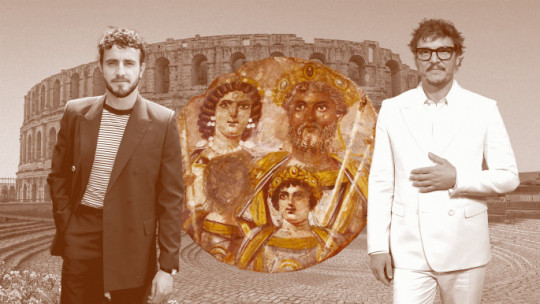

It’s been 24 years since Maximus Decimus Meridius had his vengeance in Ridley Scott’s historical epic Gladiator.
Today it is still a world-beloved piece of cinema in which screenwriters David Franzoni, John Logan and William Nicholson wove real-life figures of Ancient Rome into their fictionalised account of a general-turned-slave-turned-gladiator, iconically played by Russell Crowe.
This November, a sequel is headed to cinemas, set potentially 15-20 years after Maximus brushed his way through a wheatfield to the afterlife.
Irish actor Paul Mescal takes over as the lead, playing a grown-up Lucius Verus who first appeared as the child heir to the Roman Empire in the original film set during AD 180.
To begin Gladiator II, David Scarpa, Peter Craig and Franzoni’s script has him packed off as a child to Numidia – which today would roughly cover the area of modern western Tunisia and eastern Algeria) in North Africa – by his mother Lucilla (Connie Nielsen reprising the role) to grow up away from the scheming Roman senate.
Lucius has a wife and child but has had no contact with his mother for 15 years. There’s also the small problem of Rome, ruled by co-emperors Caracalla (Joseph Quinn) and Geta (Fred Hechinger) wanting to expand their empire further into North Africa.
Fictional Roman General Marcus Acacius (Pedro Pascal) invades the coastal village where Lucius lives and he is subsequently enslaved as a, you guessed it, gladiator.
Denzel Washington is thrown into the mix as Macrinus, described by Scott as “a power broker and arms dealer” who enlists Lucius in his plot to usurp the rule of Rome.
As a critic of mixed British and Tunisian heritage, with a Tanit tattoo on my right forearm, I have more than a passing interest in the representation of North Africa on screen, especially in films set during classical antiquity.
The Carthaginian Empire is “my Roman Empire” but I’m fully aware of Hollywood’s annoying habit of white-washing, erasing and/or misrepresenting the Maghreb’s history and inhabitants.
Ridley Scott’s filmography is far too guilty of that – Gladiator included.
Not only did the 2000 film manage to perpetuate negative stereotypes about Arabs but it also belies their historical movements.
The story introduces grotesque Arabic-speaking slavers who capture an injured and bereaved Maximus at his home in Spain.
Fun fact: there is no evidence that Arab slavers operated in Spain, as confirmed by the Gladiator’s historical consultant Professor Kathleen Coleman who was “unpleasantly surprised” when she saw the final film.
“I was under the impression that although the plot was fictitious [Dreamworks] wanted the atmosphere to be authentic,” she said. “But that is evidently not the case.”
The ugly-looking, Tuarag-wearing slavers take Maximus in a camel caravan to the Roman province of Zucchabar (Miliana in modern-day Algeria) which is presented as a dirty, sweaty, fly-invested burg.
The scene was shot at Ksar of Ait-Ben-Haddou located in an inland village in Morocco. It looks a lot different from the green, mountainous landscape of the region once inhabited by Romanised Amazighs (Berber).
Of course, Hollywood has to portray North Africa as a barren, desert wasteland.
British-Iranian Omid Djalili once again plays a slimy, unscrupulous Arab (remember him in The Mummy?) trying to get a “special price” for his slaves.
He also says he picked up Djimon Hounsou’s Numidian Juba from a “salt mine in Carthage.”
Juba was a well-known Numidian name — King Juba II was a client king of Numidia and married Cleopatra Selene, the only daughter of Queen Cleopatra VII and Mark Antony.
But given the brazen historical inaccuracies in the film, I wouldn’t be surprised if this line is a mistaken reference to the false myth of the Romans sowing the city of Carthage (Ancient Tunisia) with salt after winning the third Punic War – not the salt mines of Carthago Nova (New Carthage) in southern Spain.
A place where we’ve already established Arab slavers did not operate. A look at the first trailer for Gladiator II, the cast and interviews prove it has already prevented Middle Eastern, North African and Arab actors from playing real-life characters with shared ethnicities.
Let’s start with the brother emperors Geta and Caracalla. They are the sons of Septimius Severus and his second wife Julia Domna who briefly shared power after their father died in AD 211.
Severus was born in Leptis Magna, a trading city on the coast of Ancient Libya founded by Phoenician merchants from Tyre/Syria centuries earlier.
It was a prominent municipality in the Carthaginian Empire and when Severus became emperor, he turned it into a thriving metropolis. He had maternal Italian and paternal Punic ancestry and after a few civil wars, was proclaimed emperor of Rome in AD 193.
He was the first North African Emperor and that heritage was so much a part of his identity that the historian Cassius Dio described him as “Libyan by race.”
Severus was introduced to Julia Domna, a Syrian woman whose father was descended from the Arab Emesene dynasty.
Her surname is an Ancient Arabic word for “black” and she became Empress. Geta and Caracalla, therefore, would be of mixed ethnicity, mostly Arab-Middle Eastern and North African, but the actors playing them are not.
After her husband’s death, Julia Domna became a mediator between her sons but there’s no listing of the character on the film’s IMDb page nor sign of her in the trailer.
Instead, we have the return of Lucilla who was, in reality, executed in AD 182 for her involvement in the failed attempt to assassinate her brother Commodus.
She appears to be filling Julia Domna’s shoes which suggests another MENA character has been sidelined in favour of a white counterpart with history being altered to allow for it.
The trailer suggests Lucius spends time as a child in Egypt prior to Lucilla sending him to Numidia, thanks to pyramids and palm trees in the background of one scene showing him running away from approaching Romans.
Interestingly, Lucilla had two sons called Lucius: one with her first husband Lucius Verus, who died young, and another with her second husband Tiberius, a Roman general, who was murdered by Caracalla.
The film’s iteration appears to be a mash-up of them both.
We see a battle on Numidian soil after an attack on what appears to be a coastal fortress, launched by Acacius from the sea. If this is taking place around AD 211, then the Amazigh-nation was already a part of the Roman Province as a client state set up by Septimius Severus.
Why Rome is attacking is unclear unless they are playing with historical timelines again and showing Severus’ annexation of various North African settlements – including Castellum Dimmidi, Thabudeos, Gemellae, Vescera and Thubunae – to expand Numidia. But none of these colonies were coastal.
We see a female archer in armour aiming a bow and arrow which may be a nod to several North African legends of female warriors.
Asbyte was a Libyan princess and ally of Hannibal Barca during the Second Punic War, according to Silius Italicus’s poem Punica; there were the legendary Scythian warrior women who hailed from Ancient Iran and the famous Amazons who were believed to have once resided in Libya.
She appears to be played by the Israeli actress Yuval Gonen who is listed as the character Arishat (a Phoenician/Punic name) and later seen dead in the arms of Lucius with an arrow through her chest.
If this is his Numidian, Libyan or Carthaginian wife (we see him kissing a woman who looks just like the female warrior towards the end of the trailer) then as with Djimon Hounsou’s Juba in the first film, actors with Algerian, Libyan and Tunisian, even Lebanese or Syrian heritage, have been overlooked.
The same goes for Washington’s Macrinus. Seemingly based on the real-life figure Marcus Opellius Macrinus, he was a Praetorian prefect in charge of Rome’s civil affairs, but of Berber origin and born in Caesarea of Ancient Mauretania (modern Cherchell, Algeria).
Fearing for his life after it was prophesied that he and his son would reign over Rome, he enlisted a Roman soldier to be his “tool” in the assassination of Caracalla, and the film seems to follow suit.
Washington’s casting is certainly a better choice than seeing yet another white actor cast as a Roman politician; Derek Jacobi is back as Gracchus with Matt Lucas and Tim McInnerny joining as figures in Rome’s elite.
Like Macrinus, the actor has African heritage but Africa is a continent, not a country and too often Hollywood fails to represent the diversity of that fact.
Instead, they opt for racial binaries that limit Ancient figures to black and white. The only North African in the main cast list is that of Egyptian-Palestinian actress May Calamawy. Her casting was announced in May 2023 but she doesn’t appear in the trailer and no character information has been shared. So, did she make the cut?
Gladiator II looks set to be yet another blockbuster epic choosing to botch historical facts and project anachronistic ideas about race onto classical antiquity.
The Roman Empire and Roman North Africa was a place and period defined by its ethnic diversity and a throughline of those ethnicities can be traced to the people living across Algeria, Libya, Tunisia, Syria and Lebanon today and in the diaspora.
Unfortunately, people with that ancestry have once again been denied the opportunity to play a role in the commitment of their iconic heritage to cinematic history.
It’s the Hollywood story of our lives and I’m tired of it.
Hanna Flint is a film and TV critic, writer and author of Strong Female Character with bylines at Empire, Time Out, Elle, Town & Country, the Guardian, BBC Culture and IGN
Follow her here: @HannaFlint
0 notes
Text
Why Isn't Spencer Treat Clark Playing Lucius in 'Gladiator 2?
The trailer for the “Gladiator” sequel dropped on Tuesday, leaving fans wondering why Paul Mescal plays slave fighter Lucius instead of Spencer Treat Clark, who played him in the original.
Ridley Scott’s “Gladiator” starred Russell Crowe as Maximus Decimus Meridius, a former Roman general who is betrayed and sold into slavery. The film sees Lucius, the heir to the Roman Empire, watch Maximus…
0 notes
Text
0 notes
Text
Here are the top 20 iconic action movies, each with a brief description:
1. **Die Hard (1988):** Directed by John McTiernan, this film stars Bruce Willis as NYPD officer John McClane, who single-handedly takes on a group of terrorists in a Los Angeles skyscraper during a Christmas party.
2. **Mad Max: Fury Road (2015):** Directed by George Miller, this post-apocalyptic action film follows Max Rockatansky (Tom Hardy) and Furiosa (Charlize Theron) as they escape from a tyrannical warlord across a desert wasteland.
3. **Léon: The Professional (1994):** Directed by Luc Besson, this film tells the story of a hitman (Jean Reno) who forms an unusual relationship with a young girl (Natalie Portman) he takes in after her family is killed by corrupt DEA agents.
4. **John Wick (2014):** Directed by Chad Stahelski, Keanu Reeves plays a former hitman seeking vengeance for the death of his beloved dog, taking on the criminal underworld in a stylish and action-packed manner.
5. **The Dark Knight (2008):** Directed by Christopher Nolan, this Batman film features Christian Bale as Batman and Heath Ledger as the Joker, exploring the battle between order and chaos in Gotham City.
6. **Terminator 2: Judgment Day (1991):** Directed by James Cameron, this sci-fi action film stars Arnold Schwarzenegger as the Terminator, a cyborg sent back in time to protect John Connor, a future leader, from a more advanced Terminator.
7. **The Matrix (1999):** Directed by the Wachowski siblings, Keanu Reeves stars as Neo, a computer hacker who discovers the truth about the reality he lives in and becomes a hero in a virtual world.
8. **Gladiator (2000):** Directed by Ridley Scott, this historical action film stars Russell Crowe as Maximus Decimus Meridius, a former Roman general seeking vengeance against the corrupt emperor who killed his family.
9. **Inception (2010):** Directed by Christopher Nolan, this mind-bending action film features Leonardo DiCaprio as a thief who enters people's dreams to steal their secrets, exploring the concept of shared dreaming.
10. **Braveheart (1995):** Directed by Mel Gibson, this historical epic follows William Wallace (Mel Gibson), a Scottish knight who leads a rebellion against the English during the First War of Scottish Independence.
11. **The Bourne Identity (2002):** Directed by Doug Liman, this film stars Matt Damon as Jason Bourne, a man suffering from amnesia who discovers he's a trained assassin, leading to a thrilling chase across Europe.
12. **Speed (1994):** Directed by Jan de Bont, this action thriller stars Keanu Reeves and Sandra Bullock as they try to prevent a bomb from exploding on a city bus if its speed drops below 50 miles per hour.
13. **Kill Bill: Vol. 1 (2003) / Kill Bill: Vol. 2 (2004):** Directed by Quentin Tarantino, these films follow The Bride (Uma Thurman) on her quest for vengeance against her former associates in a stylized and violent manner.
14. **The Raid: Redemption (2011):** Directed by Gareth Evans, this Indonesian action film showcases a SWAT team trapped in a high-rise building filled with criminals, leading to intense and martial arts-infused combat scenes.
15. **Crouching Tiger, Hidden Dragon (2000):** Directed by Ang Lee, this martial arts epic features a mix of romance and action, telling the story of legendary warriors in ancient China.
16. **The Avengers (2012):** Directed by Joss Whedon, this superhero ensemble film brings together Iron Man, Captain America, Thor, Hulk, and others to save the world from a powerful alien threat.
17. **Aliens (1986):** Directed by James Cameron, this sci-fi action film is a sequel to Ridley Scott's "Alien" and follows Ellen Ripley (Sigourney Weaver) as she returns to the planet where the alien creatures were first encountered.
18. **Raiders of the Lost Ark (1981):** Directed by Steven Spielberg, this adventure film introduces Indiana Jones (Harrison Ford), an archaeologist and adventurer, as he races against Nazi agents to find the Ark of the Covenant.
19. **Django Unchained (2012):** Directed by Quentin Tarantino, this Western film stars Jamie Foxx as Django, a freed slave who teams up with a bounty hunter (Christoph Waltz) to rescue his wife from a brutal plantation owner.
20. **Enter the Dragon (1973):** Directed by Robert Clouse, this martial arts film stars Bruce Lee as a martial artist who infiltrates a deadly crime lord's island tournament, showcasing Lee's incredible fighting skills.
These films have been celebrated for their thrilling action sequences, compelling characters, and enduring influence on the action genre in cinema.

0 notes
Text
Gladiator 2000 Film Review: How Far Can a Man Go to Avenge His Family
Released in 2000, Gladiator is an epic historical action film directed by Ridley Scott and starring Russell Crowe as the lead character, Maximus Decimus Meridius. The film tells the story of a Roman general who is betrayed and enslaved and ultimately seeks revenge against the emperor who killed his wife and son and burnt his house and betrayed him.
The film was a critical and commercial success,…

View On WordPress
0 notes
Photo
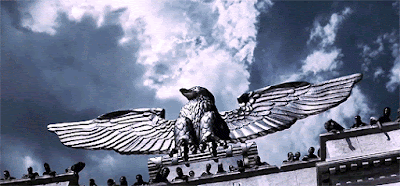

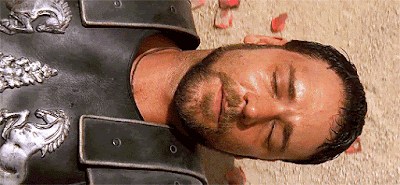
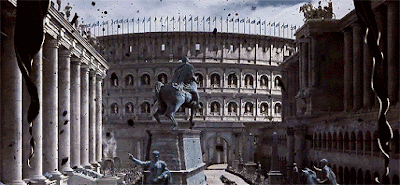
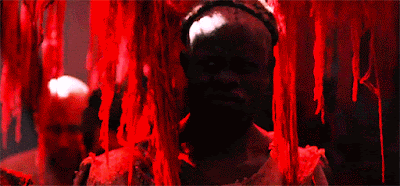
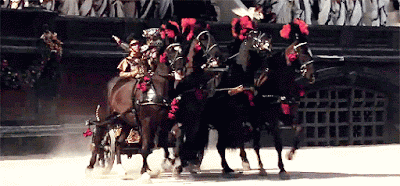
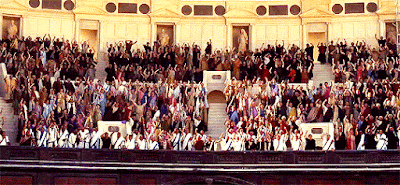

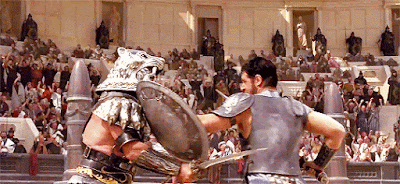
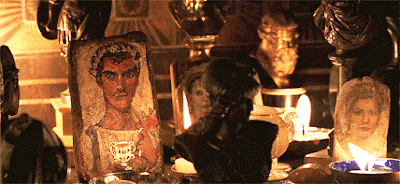
Gladiator
Gladiator is a 2000 American-British epic historical drama film directed by Ridley Scott and written by David Franzoni, John Logan, and William Nicholson. The film was co-produced and released by DreamWorks Pictures and Universal Pictures. DreamWorks Pictures distributed the film in North America while Universal Pictures released it internationally through United International Pictures. It stars Russell Crowe, Joaquin Phoenix, Connie Nielsen, Ralf Möller, Oliver Reed (in his final role), Djimon Hounsou, Derek Jacobi, John Shrapnel, Richard Harris, and Tommy Flanagan. Crowe portrays Roman general Maximus Decimus Meridius, who is betrayed when Commodus, the ambitious son of Emperor Marcus Aurelius, murders his father and seizes the throne. Reduced to slavery, Maximus becomes a gladiator and rises through the ranks of the arena to avenge the murders of his family and his emperor.
Inspired by Daniel P. Mannix's 1958 book Those About to Die (formerly titled The Way of the Gladiator), the film's script, initially written by Franzoni, was acquired by DreamWorks and Ridley Scott signed on to direct the film. Principal photography began in January 1999, before the script was completed, and wrapped up in May of that year, with the scenes of Ancient Rome shot over a period of nineteen weeks in Fort Ricasoli, Malta. The film's computer-generated imagery effects were created by British post-production company The Mill, who also created a digital body double for the remaining scenes involving Reed's character Proximo due to Reed dying of a heart attack during production.
Gladiator premiered in Los Angeles on May 1, 2000, and was released theatrically in Australia on May 4, the United States on May 5 and in the United Kingdom on May 11. The film received generally positive reviews from critics, with praise for the acting (particularly Crowe's and Phoenix's performances), Scott's direction, visuals, screenplay, action sequences, musical score and the production values. It was a box office success, grossing $187.7 million in the United States and grossed $457 million worldwide, making it the second highest-grossing film of 2000. The film won multiple awards, including five at the 73rd Academy Awards: Best Picture, Best Actor for Crowe, Best Costume Design, Best Sound and Best Visual Effects. It also received four BAFTA Awards at the 54th British Academy Film Awards for Best Film, Best Cinematography, Best Production Design and Best Editing. Since its release, Gladiator has also been credited with reinventing the sword-and-sandal genre and rekindling interest in entertainment centered around the cultures of ancient Greece and Rome, such as the television series Rome.
In 2021, Scott officially announced that writing had begun on a sequel to the film, which would formally enter development after the completion of his Napoleon biopic Kitbag.
#Gladiator#2000 Historical Drama Film#Ridley Scott#Russell Crowe#Joaquin Phoenix#Roman General Maximus Decimus Meridius#Emperor Marcus Aurelius#Commodus#history#ancient history#ancient civilizations#roman history#ancient rome#roman empire
198 notes
·
View notes
Text
‘Aftermath’ Chapter 12: History Has Its Eyes on You (Commodus x OC)
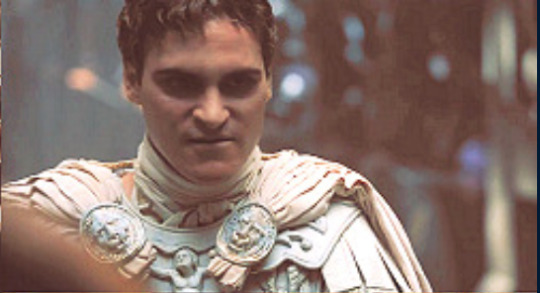
(image source: @attackofthesith)
Summary: Emperor Commodus finds a taste of paradise after a long time in his personal darkness. Meanwhile, Petronius and Philomenus take the biggest stand of their lives, determined to bring the republic back and honor the late Caesar.
Word Count: 2,414
Warning: Violence, angst, character death
Read Part 1: The Impossible Dream here
Read Part 2: Proud of Your Boy here
Read Part 3: Point of No Return here
Read Part 4: Look Down here
Read Part 5: Beneath a Moonless Sky here
Read Part 6: These Palace Walls here
Read Part 7: Wait For It here
Read Part 8: Something There here
Read Part 9: Be Prepared here
Read Part 10: Twisted Every Way here
Read Part 11: All I Ask of You here
Philomenus never wanted to run. At least that’s what he hoped that people would say when they told his story.
Approaching the Colosseum with daggers and gladii under his tunic, the centurion had never felt more alive that before. Philomenus kept thinking about how happy Claudia would be to raise their siblings in a republic, how delighted their deceased parents would be with their offspring, and how heroic he would stand in the face of his young twin brother and sister.
For someone who had never participated in a scheme before, deception came rather easily to him. With a few sweet words, Philomenus was able to charm one of the guards into leaving his post and surrendering his uniform. The disguise would definitely fool Commodus, he thought. The next guard would not let Philomenus pass so easily. Not after the centurion tripped and a knife fell from under his tunic with a loud clang. But one quick slash of his sword against the guard’s stomach cleared his way.
As of now, Petronius was the only one who knew about their joint plot, but they would reveal themselves as the assassins once Commodus breathed his last. The two of them would be publicly hailed as the ones who brought Rome back to her true self. The Senators would be eternally grateful to them, and they could all fearlessly honor the Spaniard who spent his life as a soldier of Rome. Finishing what he started, the centurion was confident that the soul of Maximus Decimus Meridius would finally rest in peace.
The thought of all this was enough for massive mounts of adrenaline to surge within Philomenus. He was going to be fighting for Rome in the biggest stand of his life, defending her honor as he would defend his own mother.
Petronius was right when he claimed yesterday that it was their responsibility, as comrades of the late Maximus, to exact revenge upon Commodus. The vile man had no regard for the value of human life, taking it as he pleased in the same way a child would throw around its toys. Patricide would have been the only way for Commodus to win the throne; surely Marcus Aurelius would never let his immoral son succeed him. Wisdom, justice, fortitude, and temperance…Commodus never had any of those things, and yet had the nerve to believe he deserved to become the protector of Rome. All because he was born into the household of the late Caesar!
Spitting into the ground with disgust, Philomenus clenched his jaw hearing the mob chant Commodus’s name from the seats of the Colosseum. And how Commodus would be happily eating up the attention like a dog eats from the bones thrown at him. The only thing that calmed the centurion’s wrath the knowledge that after tomorrow, that very name would be erased from the minds and tongues of Romans everywhere.
————————————————————————————————————————
The Emperor had a youthful glow upon his face when he entered the Imperial Box of the stadium. It was almost as if the Sun took a bit of its own brightness, and showered Commodus in it.
He had the most perfect morning after a long time. Rather than being disappointed by his nephew’s reluctance at breakfast, the emperor was amused by stories Prince Lucius narrated from his lessons. And instead of being agitated by a night terror, Commodus was awakened by kisses from his bride-to-be.
Wide-eyed with mildly-disheveled hair, Caesonia innocently brushed her lips along his arm. Blushing while his eyes fluttered open, Commodus held her closer and gently moved his fingers along her back. That glint in his eyes quickly turned lustful when his hand barely reached the curve of her derriere. After they realized the two of them were still naked from the night before, things quickly escalated into another session of sweet lovemaking.
If he closed his eyes now, he could still see her lying in his bed. Her shapely breasts rose and fell while she gasped for air post-coitus. The sheets barely covered the junction of her thighs, the rest of her body was drenched in sunlight and her limbs were sprawled across the mattress.
The mere sight of her looking at him so lovingly was alluring enough for Commodus to toy with the idea of spending a few more moments in bed. Though her presence was also the reason he didn’t loudly scold the guard who had come to fetch him.
Not taking his eyes off of his rose for a moment, he began to dress himself in a new set of black armor and silk purple robes. The emperor teased Caesonia that if he could not lay with his beloved one more time, then he ought to be permitted to gaze upon her beauty while he prepared to leave. Hiding her face for a moment, she giggled and hugged her knees close.
Delighted and enamored by her girlish laughter, Commodus gave her one of his togas to wear for the day. He had personally never cared for the garment, considering it fit for old men, but it seemed like the only thing in his wardrobe that a lady could wear. And the toga almost reminded Commodus of their first kiss. Caesonia wore a similar, coarser garment when they walked in the palace gardens and conversed together. He couldn’t believe that moonless evening was only a month ago; it felt as if it had been longer since then.
Murmuring her thanks, she accepted the toga, as well as his offer to help her put it on. Like young lovers, they exchanged pleasant small talk and spoke of their hopes of many more starlit nights together. Draping the silk around her slender form, Commodus pressed a kiss to her bare shoulder and requested for her to rest while he was gone. Now that she was going to be his Empress, he needed her to be healthy and in good condition to accompany him to the Games. At last, Lucilla’s chair would no longer be empty.
He wasn’t sure about how to introduce her to Lucius. His own nephew was only beginning to warm up to him, and Commodus was concerned about hurting the boy. Assuring himself that Lucius would be amicable with Caesonia, the emperor broke his fast with his nephew. The engaging conversation made the bread taste heartier, and the cheese more flavorful. He even drank less wine, usually turning to the drink in order to fill the silence. Perhaps there was hope for a new family to rid Commodus of his solitude, and shower him with the love that he yearned for so desperately.
And now, here he was, entering the Colosseum to thousands of people chanting his name with adoration. With a wave to the crowd, Commodus was confident that even the gods could not take his happiness away.
——————————————————————————————————————————
“Look well into thyself; there is always a source of strength which will always spring up if thou wilt always look.”
Petronius nodded in approval. “Is that from one of Caesar’s writings?”
“Yes,” Philomenus replied, smiling with pride like a child who’d perfectly recited his lessons. “We should say something. Like, you know, before we strike.”
The centurion was immediately hushed by his accomplice. It was no secret to the general that announcing themselves was a stupid idea. “If we say too much now, then we may not get a chance to say anything else.” Moreover, Petronius had no interest in listening to words from someone who was reluctant to take action. He would not rest until Lucius Aelius Aurelius Commodus was dead.
Relenting, Philomenus slumped against the walls of the tunnel with his weapon in hand. “He’ll come here, right? Not anywhere else?”
“Yes,” Petronius gritted through his teeth, finding himself annoyed with the other man almost as much as he was annoyed by Senator Gaius. That old man kept bombarding him with rebuttals and offering no sympathy for Petronius’s view. Let them wait for Commodus to lose his sanity, he thought to himself, but I cannot. The people of Rome will not wait. Eyes burning with vengeance, the general kept his demeanor calm while his fingers became acquainted with the blade and hilt of one of Philomenus’s weapons.
Much like Philomenus, Petronius too had a sister who’d be waiting to congratulate him with open arms. But he knew that thoughts of her would be nothing but an obstacle in this quest of his. He needed to remain focused on what he wanted more than anything; the death of the man responsible for destroying Rome. Commodus needed to pay for what he’d done, and he could not bribe with bread and circuses for long.
The two men stood apart from each other at opposite sides of the tunnel. They hadn’t discussed how they planned to lunge at their target, or whether or not there would be many Praetorians there to stand in the way. Yet, perhaps Commodus would be sufficiently intoxicated by bloodshed, power, and attention from the Games, thus making it easier for him to be killed. Petronius hoped that such would be true, listening intently while the announcer commented on each event of the day.
Just when their knees began to feel the slightest hint of fatigue, the doors of the tunnel loudly swung open. A herald broke the silence, proclaiming that the Emperor of Rome was to arrive. This was it. This was the moment they’d been waiting for. This was…
“For Marcus Aurelius!!” Philomenus screamed, latching onto Commodus’s shoulder and slashing his sword against the emperor’s armor. Commodus stumbled backwards, taken aback by the sudden mention of his father’s name. Almost immediately, he commanded his Praetorians to take action. Petronius fought the three Praetorians that tried to capture him, disarming them with quick succession. The three of them fell to the ground with fatal wounds to their chests and legs.
Philomenus continued to duel with the infuriated Commodus, who’d effectively countered each and every blow the general launched. Despite Philomenus’s dagger being paltry against Commodus’s well-fashioned sword, the centurion stood his ground. “You will pay for what you’ve done, Commodus!” He yelled, defiantly calling the emperor by name.
Commodus said nothing in reply, instead using his might to push Philomenus against the wall and kick the centurion with his knee. Philomenus skillfully dodged Commodus’s attempts to stab him in the chest, continuing to taunt mercilessly.
Meanwhile, Petronius had managed to fend off the other Praetorians, even kicking one of them in the chest and sending him into the dust. His heart was pounding wildly like a war drum as he continued to attack the other guards standing in the tunnel.
One of them was able to snatch the weapon away from Petronius, kicking the general to the ground in the same way he’d kicked a Praetorian. Clenching his fists, Petronius spat at the guard and wiped his bleeding nose with a dead Praetorian’s purple cloak. He picked up a stray weapon and retaliated.
And Philomenus seemed to be using words more than swordplay with the emperor. “You’re nothing but a vile man! You’re nothing! Everyone who’s ever loved you has turned their backs on you!” Commodus continued to say nothing while lunging his attacks, instead resisting the urge to cut off his opponent’s tongue.
Philomenus kicked Commodus, sending him to the ground while the laurel crown fell off Commodus’s head. The emperor touched his own lip to find it bleeding profusely. With a snarl, he quickly stood back up and gripped his sword again. Only this time, he was attacked from behind by Petronius.
“This is your chance, Philomenus!” Petronius yelled while he ducked Commodus’s blows. Petronius raised his dagger, preparing to stab Commodus’s neck. Unfortunately, the centurion was too slow.
Commodus took advantage of Petronius’s fatigue, slashing the general’s ribs through the thin armor. And within the blink of an eye, Petronius collapsed dead.
The sheer sight of the general’s fall was too much to bear for Philomenus. Before Commodus could turn around, the centurion had sprinted off as if he were running from a fire. The emperor smeared Petronius’s blood onto his face, turning to valiantly face his surroundings like a lion asserting its territory.
Commodus didn’t know where the man known as “Philomenus” had gone, but he was too dizzy from this near-death experience to interrogate. He vowed to himself to punish that traitor appropriately…for now, though, the emperor fell to his knees and attempted to steady his breathing, so as not to black out from exertion.
——————————————————————————————————————————-
It was just a momentary fear, Philomenus told himself once he was far away from the stadium. He didn’t know what he was thinking, his legs pumping furiously as he ran out of the Colosseum. Rather, Philomenus did not even know if he was thinking in that moment.
Why would he run now, after thinking so long about how great things would be after Commodus was dead?
Marcus Aurelius would be disappointed, and so would his parents, but…perhaps Claudia would not be so angry. After all, wasn’t she the one who tried to dissuade him from his plan?
All he needed now was to get home before Commodus could send his men. Philomenus was not unaware of the treatment Maximus’s family received for Maximus’s insubordination. If not the last, his family would not be the next one in Commodus’s reign of terror.
—————————————————————————————————————————
Thank the gods I sent Lucius home with Senator Falco as an escort. Commodus swallowed hard while he watched his nephew go to his chamber without a care in the world, knowing nothing about the attempt on his uncle’s life. He knew the prince wanted to become independent of his family, but Commodus of all people had just witnessed what happens when royals begin to let down their guard.
With a glare, the emperor ordered one of the Praetorians in the palace to bring his betrothed to him and then immediately lock the doors. His cold gaze burned into her skin as she carefully approached him and wiped the blood off his face.
Commodus’s inner demons convinced him that there was an equal chance of a surprise assassination attempt as there was of a deceitful bride-to-be. On any other day, he wouldn’t believe those voices. But this was no ordinary day - had he been careless, Rome would be left without a protector. And he would have left his children without a father.
Gripping her hand and digging his nails into her skin, Commodus ordered her in a shaky yet steely voice.
“Disrobe, now.”
31 notes
·
View notes
Link

It's two decades later and we are still incredibly entertained by this movie. The winner of the Oscar for Best Picture from the turn of the millennium is undoubtedly one that nobody has forgotten about, however, audiences might be surprised to hear that the film is turning 20 years old since it feels like yesterday that they were just watching Maximus Decimus Meridius on the big-screen. The historical-fiction film about a former Roman general turned gladiator who must fight to the death in front of the very ruler who had his family murdered. We could never forget this film, but it will have its vengeance on anybody that does - in this life or the next.
8 notes
·
View notes
Text
Film Recommendations!
I thought I’d recommend some of my absolute favourite movies, because I love sharing my love of movies and just things in general with people. So, in no particular order, here is my list of recommendations:
1. Tombstone (1993)
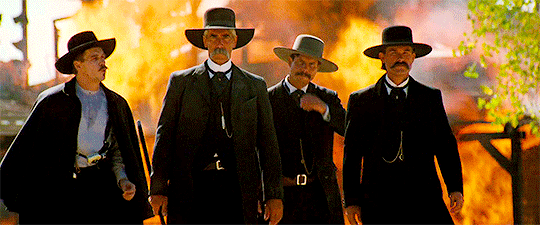
So I just watched this movie a couple days ago and absolutely loved it. Yes, it is a western. Do you need to like westerns to watch it? Nope. That’s why it’s great. And, it’s based on real people/real events. I sobbed hysterically at the end, but I’m also a huge sap. Val Kilmer as Doc Holliday is perfection. I love love love him.
Here’s the plot summary: Wyatt Earp (Kurt Russell) and his brothers, Morgan (Bill Paxton) and Virgil (Sam Elliott), have left their gunslinger ways behind them to settle down and start a business in the town of Tombstone, Ariz. While they aren't looking to find trouble, trouble soon finds them when they become targets of the ruthless Cowboy gang. Now, together with Wyatt's best friend, Doc Holliday (Val Kilmer), the brothers pick up their guns once more to restore order to a lawless land.
Quotes:
“I’m your huckleberry.”
“Why, Johnny Ringo, you look like somebody just walked over your grave.”
“You gonna do somethin’ or just stand there and bleed?”
2. Fight Club (1999)

Okay. Okay. I just watched this one, too, and let me tell you. If you haven’t seen it/haven’t been spoiled for it, you have no idea what it’s really about. Honestly. It’s so fuckin’ weird and it blew my mind which is something I thought only M. Night Shyamalan could do. Wow, just. . . wow. Watch it, I implore you. I think everyone essentially knows the basic plot, but here it is if you want it, straight from google:
A depressed man (Edward Norton) suffering from insomnia meets a strange soap salesman named Tyler Durden (Brad Pitt) and soon finds himself living in his squalid house after his perfect apartment is destroyed. The two bored men form an underground club with strict rules and fight other men who are fed up with their mundane lives. Their perfect partnership frays when Marla (Helena Bonham Carter), a fellow support group crasher, attracts Tyler's attention.
Quotes:
“You met me at a very strange time in my life.”
“The things you own end up owning you.”
“It’s only after we’ve lost everything that we’re free to do anything.”
3. Unbreakable (2000)
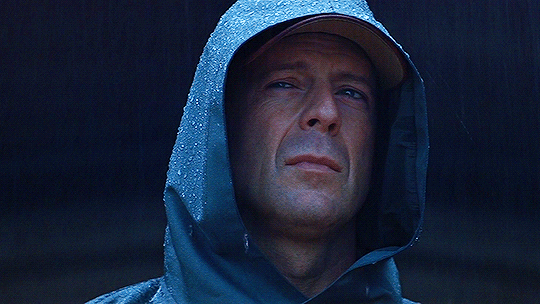
Speaking of M. Night Shyamalan. While every one of his movies I’ve seen (Split, Glass, Lady in the Water, The Visit) have all been fantastic and mind-blowing, Unbreakable still has my favourite premise and my favourite Shyamalan twist ending. I love this one, even though I don’t really care for Bruce Willis.
Plot summary: A security guard, having been the sole survivor of a high-fatality train crash, finds himself at the centre of a mysterious theory that explains his consistent physical good fortune. When news of his survival is made public, a man whose own body is excessively weak tracks him down in an attempt to explain his unique unbreakable nature.
Quotes:
“Do you know what the scariest thing is? To not know your place in this world. To not know why you’re here.”
4. This is the End (2013)
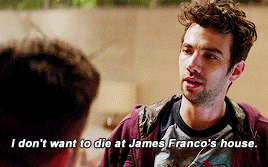
Seth Rogen. Jay Baruchel. James Franco. Jonah Hill. Danny McBride. Craig Robinson. Playing themselves. The apocalypse. Hilarity ensues. Cameos from Emma Watson, Kevin Hart, Michael Cera, Rihanna, Paul Rudd, Channing Tatum, Aziz Ansari, Jason Segel, Mindy Kaling, and the Backstreet Boys. It’s so funny, I absolutely love it.
Plot summary: In Hollywood, actor James Franco is throwing a party with a slew of celebrity pals. Among those in attendance are his buddies Jonah Hill, Seth Rogen, Jay Baruchel, Danny McBride and Craig Robinson. Suddenly, an apocalypse of biblical proportions erupts, causing untold carnage among Tinseltown's elite and trapping Franco's party in his home. As the world they knew disintegrates outside, cabin fever and dwindling supplies threaten to tear the six friends apart.
Quotes:
“I don’t want to die at James Franco’s house.”
“Oh, no, no, no. I’m drinking and smoking weed. I’m on a cleanse, I’m not psychotic.”
“Take it easy, Dumbledore.”
5. You’ve Got Mail (1998)
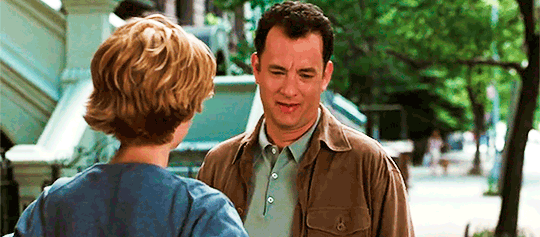
Meg Ryan and Tom Hanks. This might be my favourite romantic comedy, and I watch a lot. They’re adorable, and Meg Ryan is everything. This one made me cry twice. Once from sadness, once from happiness. Also it has Dave Chappelle in it, who I absolutely love.
Plot summary: Struggling boutique bookseller Kathleen Kelly (Meg Ryan) hates Joe Fox (Tom Hanks), the owner of a corporate Foxbooks chain store that just moved in across the street. When they meet online, however, they begin an intense and anonymous Internet romance, oblivious of each other's true identity. Eventually Joe learns that the enchanting woman he's involved with is actually his business rival. He must now struggle to reconcile his real-life dislike for her with the cyber love he's come to feel.
Quotes:
“There’s the dream of someone else.”
“But I just wanted to say that all this nothing has meant more to me than so many somethings.”
“I love daisies. They’re so friendly. Don’t you think daisies are the friendliest flower?”
6. A Hard Day’s Night (1964)
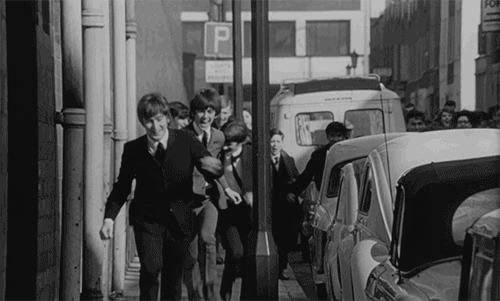
For anyone who loves The Beatles. Here they play themselves, and show what their lives are like. It’s ridiculous and hilarious and god, if I didn’t love them before I loved them dearly after watching. It’s such a fun, easy watch and I adore it.
Plot summary: Over two "typical" days in the life of The Beatles, the boys struggle to keep themselves and Sir Paul McCartney's mischievous grandfather in check while preparing for a live television performance.
Quotes:
“How did you find America?” “Turned left at Greenland.”
“Hey mister can we have our ball back!”
“You’re a swine.”
7. Dazed and Confused (1993)

My favourite movie to watch at the beginning and end of the school year, and let’s be honest, every month in between. I’ve seen this movie more times than I can say. I love the ‘70’s setting, the actors, the plot. Another wonderful, easy watch that just makes me happy. Killer soundtrack, too.
Plot summary: The adventures of high school and junior high students on the last day of school in May 1976.
Quotes:
“You just gotta keep livin’, man. L-i-v-i-n.”
“It’d be a lot cooler if you did.”
“I just wanna look back and say that I did it the best that I could while I was stuck in this place.”
“I’d like to quit thinking of the present, like right now, is some minor, insignificant preamble to somethin’ else.”
8. Dirty Dancing (1987)

Anything with Patrick Swayze is wonderful, and this is no exception. Johnny and Baby are perfect. This movie also has the best soundtrack of any movie I’ve ever watched. Fantastic love story, fantastic movie. Watch it.
Plot summary: Baby (Jennifer Grey) is one listless summer away from the Peace Corps. Hoping to enjoy her youth while it lasts, she's disappointed when her summer plans deposit her at a sleepy resort in the Catskills with her parents. Her luck turns around, however, when the resort's dance instructor, Johnny (Patrick Swayze), enlists Baby as his new partner, and the two fall in love. Baby's father forbids her from seeing Johnny, but she's determined to help him perform the last big dance of the summer.
Quotes:
“Nobody puts Baby in a corner.”
“Fight harder, huh? I don’t see you fighting so hard, Baby. I don’t see you running up to daddy telling him I’m your guy.”
“You’re right, Johnny. You can’t win no matter what you do.”
“Go back to your playpen, Baby.”
9. The Sound of Music (1965)
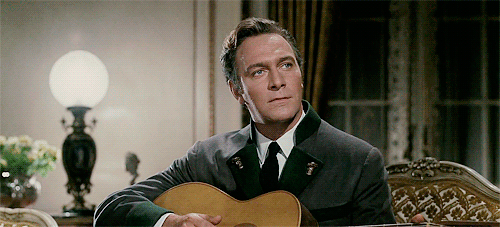
This is such a beautiful movie, and I love it so much. My mom and I try to watch it every Christmas as our little tradition. Julie Andrews as Maria is so wonderful, and all of the songs are so, so good. I love all of the children dearly, and oh, do I love Captain VonTrapp.
Plot summary: A tuneful, heartwarming story, it is based on the real life story of the Von Trapp Family singers, one of the world's best-known concert groups in the era immediately preceding World War II. Julie Andrews plays the role of Maria, the tomboyish postulant at an Austrian abbey who becomes a governess in the home of a widowed naval captain with seven children, and brings a new love of life and music into the home.
Quotes:
“You cry a little, and then you wait for the sun to come out. It always does.”
“God bless Louisa, Brigitta, Marta, and little Gretl. Oh, I forgot the other boy. What’s his name? Well, god bless what’s-his-name.”
“I want you to stay. I ask you to stay.”
10. Gladiator (2000)

“Are you not entertained?” I think everyone has heard that line, from this amazing movie. One of the many that has made me cry, it’s such a beautiful story. Also, gladiators. That immediately sells it for me. All of the performances by the actors are top notch as well.
Plot summary: Set in Roman times, the story of a once-powerful general forced to become a common gladiator. The emperor's son is enraged when he is passed over as heir in favour of his father's favourite general. He kills his father and arranges the murder of the general's family, and the general is sold into slavery to be trained as a gladiator - but his subsequent popularity in the arena threatens the throne.
Quotes:
“My name is Maximus Decimus Meridius. Commander of the Armies of the North, General of the Felix Legions, and loyal servant to the true emperor, Marcus Aurelius. Father to a murdered son, husband to a murdered wife. And I will have my vengeance. In this life or the next.”
“What we do in life echoes in eternity.”
“Falling down is how we grow. Staying down is how we die.”
#studyblr#mine#movies#tombstone#fight club#dazed and confused#favourite movies#gladiator#this is the end#dirty dancing#you’ve got mail#unbreakable#a hard day's night#the beatles#the sound of music#80s#90s#80s movies#90s movies#john hughes
11 notes
·
View notes
Text
Gladiator II: A missed chance for North African representation
New Post has been published on https://sa7ab.info/2024/08/11/gladiator-ii-a-missed-chance-for-north-african-representation-2/
Gladiator II: A missed chance for North African representation


It’s been 24 years since Maximus Decimus Meridius had his vengeance in Ridley Scott’s historical epic Gladiator.
Today it is still a world-beloved piece of cinema in which screenwriters David Franzoni, John Logan and William Nicholson wove real-life figures of Ancient Rome into their fictionalised account of a general-turned-slave-turned-gladiator, iconically played by Russell Crowe.
This November, a sequel is headed to cinemas, set potentially 15-20 years after Maximus brushed his way through a wheatfield to the afterlife.
Irish actor Paul Mescal takes over as the lead, playing a grown-up Lucius Verus who first appeared as the child heir to the Roman Empire in the original film set during AD 180.
To begin Gladiator II, David Scarpa, Peter Craig and Franzoni’s script has him packed off as a child to Numidia – which today would roughly cover the area of modern western Tunisia and eastern Algeria) in North Africa – by his mother Lucilla (Connie Nielsen reprising the role) to grow up away from the scheming Roman senate.
Lucius has a wife and child but has had no contact with his mother for 15 years. There’s also the small problem of Rome, ruled by co-emperors Caracalla (Joseph Quinn) and Geta (Fred Hechinger) wanting to expand their empire further into North Africa.
Fictional Roman General Marcus Acacius (Pedro Pascal) invades the coastal village where Lucius lives and he is subsequently enslaved as a, you guessed it, gladiator.
Denzel Washington is thrown into the mix as Macrinus, described by Scott as “a power broker and arms dealer” who enlists Lucius in his plot to usurp the rule of Rome.
As a critic of mixed British and Tunisian heritage, with a Tanit tattoo on my right forearm, I have more than a passing interest in the representation of North Africa on screen, especially in films set during classical antiquity.
The Carthaginian Empire is “my Roman Empire” but I’m fully aware of Hollywood’s annoying habit of white-washing, erasing and/or misrepresenting the Maghreb’s history and inhabitants.
Ridley Scott’s filmography is far too guilty of that – Gladiator included.
Not only did the 2000 film manage to perpetuate negative stereotypes about Arabs but it also belies their historical movements.
The story introduces grotesque Arabic-speaking slavers who capture an injured and bereaved Maximus at his home in Spain.
Fun fact: there is no evidence that Arab slavers operated in Spain, as confirmed by the Gladiator’s historical consultant Professor Kathleen Coleman who was “unpleasantly surprised” when she saw the final film.
“I was under the impression that although the plot was fictitious [Dreamworks] wanted the atmosphere to be authentic,” she said. “But that is evidently not the case.”
The ugly-looking, Tuarag-wearing slavers take Maximus in a camel caravan to the Roman province of Zucchabar (Miliana in modern-day Algeria) which is presented as a dirty, sweaty, fly-invested burg.
The scene was shot at Ksar of Ait-Ben-Haddou located in an inland village in Morocco. It looks a lot different from the green, mountainous landscape of the region once inhabited by Romanised Amazighs (Berber).
Of course, Hollywood has to portray North Africa as a barren, desert wasteland.
British-Iranian Omid Djalili once again plays a slimy, unscrupulous Arab (remember him in The Mummy?) trying to get a “special price” for his slaves.
He also says he picked up Djimon Hounsou’s Numidian Juba from a “salt mine in Carthage.”
Juba was a well-known Numidian name — King Juba II was a client king of Numidia and married Cleopatra Selene, the only daughter of Queen Cleopatra VII and Mark Antony.
But given the brazen historical inaccuracies in the film, I wouldn’t be surprised if this line is a mistaken reference to the false myth of the Romans sowing the city of Carthage (Ancient Tunisia) with salt after winning the third Punic War – not the salt mines of Carthago Nova (New Carthage) in southern Spain.
A place where we’ve already established Arab slavers did not operate. A look at the first trailer for Gladiator II, the cast and interviews prove it has already prevented Middle Eastern, North African and Arab actors from playing real-life characters with shared ethnicities.
Let’s start with the brother emperors Geta and Caracalla. They are the sons of Septimius Severus and his second wife Julia Domna who briefly shared power after their father died in AD 211.
Severus was born in Leptis Magna, a trading city on the coast of Ancient Libya founded by Phoenician merchants from Tyre/Syria centuries earlier.
It was a prominent municipality in the Carthaginian Empire and when Severus became emperor, he turned it into a thriving metropolis. He had maternal Italian and paternal Punic ancestry and after a few civil wars, was proclaimed emperor of Rome in AD 193.
He was the first North African Emperor and that heritage was so much a part of his identity that the historian Cassius Dio described him as “Libyan by race.”
Severus was introduced to Julia Domna, a Syrian woman whose father was descended from the Arab Emesene dynasty.
Her surname is an Ancient Arabic word for “black” and she became Empress. Geta and Caracalla, therefore, would be of mixed ethnicity, mostly Arab-Middle Eastern and North African, but the actors playing them are not.
After her husband’s death, Julia Domna became a mediator between her sons but there’s no listing of the character on the film’s IMDb page nor sign of her in the trailer.
Instead, we have the return of Lucilla who was, in reality, executed in AD 182 for her involvement in the failed attempt to assassinate her brother Commodus.
She appears to be filling Julia Domna’s shoes which suggests another MENA character has been sidelined in favour of a white counterpart with history being altered to allow for it.
The trailer suggests Lucius spends time as a child in Egypt prior to Lucilla sending him to Numidia, thanks to pyramids and palm trees in the background of one scene showing him running away from approaching Romans.
Interestingly, Lucilla had two sons called Lucius: one with her first husband Lucius Verus, who died young, and another with her second husband Tiberius, a Roman general, who was murdered by Caracalla.
The film’s iteration appears to be a mash-up of them both.
We see a battle on Numidian soil after an attack on what appears to be a coastal fortress, launched by Acacius from the sea. If this is taking place around AD 211, then the Amazigh-nation was already a part of the Roman Province as a client state set up by Septimius Severus.
Why Rome is attacking is unclear unless they are playing with historical timelines again and showing Severus’ annexation of various North African settlements – including Castellum Dimmidi, Thabudeos, Gemellae, Vescera and Thubunae – to expand Numidia. But none of these colonies were coastal.
We see a female archer in armour aiming a bow and arrow which may be a nod to several North African legends of female warriors.
Asbyte was a Libyan princess and ally of Hannibal Barca during the Second Punic War, according to Silius Italicus’s poem Punica; there were the legendary Scythian warrior women who hailed from Ancient Iran and the famous Amazons who were believed to have once resided in Libya.
She appears to be played by the Israeli actress Yuval Gonen who is listed as the character Arishat (a Phoenician/Punic name) and later seen dead in the arms of Lucius with an arrow through her chest.
If this is his Numidian, Libyan or Carthaginian wife (we see him kissing a woman who looks just like the female warrior towards the end of the trailer) then as with Djimon Hounsou’s Juba in the first film, actors with Algerian, Libyan and Tunisian, even Lebanese or Syrian heritage, have been overlooked.
The same goes for Washington’s Macrinus. Seemingly based on the real-life figure Marcus Opellius Macrinus, he was a Praetorian prefect in charge of Rome’s civil affairs, but of Berber origin and born in Caesarea of Ancient Mauretania (modern Cherchell, Algeria).
Fearing for his life after it was prophesied that he and his son would reign over Rome, he enlisted a Roman soldier to be his “tool” in the assassination of Caracalla, and the film seems to follow suit.
Washington’s casting is certainly a better choice than seeing yet another white actor cast as a Roman politician; Derek Jacobi is back as Gracchus with Matt Lucas and Tim McInnerny joining as figures in Rome’s elite.
Like Macrinus, the actor has African heritage but Africa is a continent, not a country and too often Hollywood fails to represent the diversity of that fact.
Instead, they opt for racial binaries that limit Ancient figures to black and white. The only North African in the main cast list is that of Egyptian-Palestinian actress May Calamawy. Her casting was announced in May 2023 but she doesn’t appear in the trailer and no character information has been shared. So, did she make the cut?
Gladiator II looks set to be yet another blockbuster epic choosing to botch historical facts and project anachronistic ideas about race onto classical antiquity.
The Roman Empire and Roman North Africa was a place and period defined by its ethnic diversity and a throughline of those ethnicities can be traced to the people living across Algeria, Libya, Tunisia, Syria and Lebanon today and in the diaspora.
Unfortunately, people with that ancestry have once again been denied the opportunity to play a role in the commitment of their iconic heritage to cinematic history.
It’s the Hollywood story of our lives and I’m tired of it.
Hanna Flint is a film and TV critic, writer and author of Strong Female Character with bylines at Empire, Time Out, Elle, Town & Country, the Guardian, BBC Culture and IGN
Follow her here: @HannaFlint
0 notes
Photo

Although spoken by a fictional character (based on the real Roman General Maximus Decimus Meridius) in the movie Gladiator, these words summarize a sobering truth about life and the eternal implications and dimensions of our actions. This wisdom also embodies the Christian teaching that what we do in this life reflects whether we truly believe in and follow Jesus Christ, our Lord and Savior. As Christ cautioned, “Not everyone who says to Me, ‘Lord, Lord,’ shall enter the kingdom of heaven, but he who does the will of My Father in heaven” (Matthew 7:21). This phrase reminded me of the Communion Hymn that Orthodox Christian sometimes sing during Liturgy. “The righteous shall be in everlasting remembrance. He shall not fear evil tidings.” Based on Psalm 112:6-7, this hymn expresses the same timeless truth. More wisdom from Christ also come to mind. “For what profit is it to a man if he gains the whole world, and loses his own soul? Or what will a man give in exchange for his soul?” (Matthew 16:26) “Man shall not live by bread alone, but by every word that proceeds from the mouth of God” (Matthew 4:4). “Blessed are those who are persecuted for righteousness’ sake, For theirs is the kingdom of heaven” (Matthew 5:10). The Lord’s preaching reflects the same eternal dimensions of our conduct in this life. Gladiator presents us with other important life lessons in the conduct of General Maximus. Courage, honor, integrity, loyalty, concern and love for others, self-sacrifice, faithfulness, and strong love for family, are all essential character traits that all Christians, especially leaders, preachers, and teachers, must strive to emulate. All these important attributes can help us live a virtuous life that truly “echoes in eternity.” https://www.instagram.com/p/CU0r1l7FgqX/?utm_medium=tumblr
0 notes
Text
Gladiator
Gladiator is a historical drama, starring a Roman General ‘Maximus Decimus Meridius’, who is betrayed by the emperors sun, who killed his father and takes the throne. Maximus is then reduced to slavery and becomes a Gladiator, rising through the ranks of the arena to avenge the murders of his family and Emperor. https://en.wikipedia.org/wiki/Gladiator_(2000_film)

0 notes
Text
Did Marcus Aurelius say, “Death smiles at us all?”
From Happiness India Project Happiness India Project - A Positive Psychology Blog.
Did Marcus Aurelius say, “Death smiles at us all?”
No, Marcus Aurelius did not say it. The quote comes from the movie Gladiator, in which the lead character says those words while making an allusion to Marcus Aurelius. What comes close is this quote, “Accept death in a cheerful spirit, as nothing but the dissolution of the elements from which each living thing is composed.” (Meditations 2.17)
The Quote Marcus Aurelius Never Said
Death smiles at us all, but all a man can do is smile back.
That faux-quote attribute to Marcus Aurelius actually comes from the epic historical drama film Gladiator (2000) based on Daniel P. Mannix’s 1958 book The Way of the Gladiator. The movie won five Academy Awards at the 73rd Academy Awards, including Best Picture and Best Actor. It also won four BAFTA Awards at the 54th British Academy Film Awards, including Best Film and Best Cinematography.
Russell Crowe played the protagonist Maximus.

Russell Crowe in Gladiator (2000). Image:

and © 1999 Universal Studios and DreamWorks LLC; photo, Jaap Buitendijk
In the movie, Maximus Decimus Meridius, a general in the Roman army, intends to return home after he leads them to victory against the Germanic tribes. When he goes to meet Emperor Marcus Aurelius, the king reveals he wishes Maximus to succeed him instead of his own son, Commodus, to help save Rome from corruption and restore the Republic.
On hearing this, Commodus flies into a rage and murders his father (which is a historical error; Marcus died of old age and disease).
Commodus declares himself the new emperor of Rome and asks Maximus for his loyalty. When Maximus refuses, the Praetorian guards capture Maximus for plotting to murder the king of Rome.
But Maximus escapes and goes to his home country Spain, only to find his wife and son dead, and his house burned down. He is taken by a slave trader and sold to the gladiator trainer Proximo. Maximus soon turns out to be the gladiator who never loses a fight.
When Commodus declares to stage the gladiatorial games, Proximo goes to Rome with his gladiators. In the fight, Maximus defeats the Roman champion and reveals himself as Maximus. Commodus’ sister Lucilla, and senator Gracchus decide to help Maximus escape, so he might build his army and come back to dethrone Commodus.
Commodus discovers the plot. And gets the Praetorians to kill Proximo and the other gladiators and arrest Maximus before he could escape.
Commodus declares that he will fight Maximus in one-to-one combat in the arena. In all of Rome’s imperial history, Commodus is the first king to clash with a gladiator. All Roman rulers before him were mere spectators. Commodus confronts Maximus minutes before they are to walk into the arena for a fight to the death.
Commodus: “Do you think I am afraid?“
Maximus: “I think you have been afraid all your life.”
Commodus: “Unlike Maximus, the invincible, who knows no fear?”
Maximus: “I knew a man once who said, ‘Death smiles at us all. All a man can do is smile back.’”
Commodus: “I wonder, did your friend smile at his own death?”
Maximus: “You must know. He was your father.”
The man Maximus was alluding to was the dead emperor Marcus Aurelius, father of Commodus and the last of The Five Good Emperors. History holds Commodus as an arrogant and inglorious son and a timorous and undeserving successor to the mightiest Stoic to have ever walked this earth, Marcus Aurelius — The Philosopher King.
After their exchange, Commodus stabs Maximus to weaken him. In the fighting arena, however, Maximus kills Commodus and orders the restoration of power to the Senate and revival of Republican rule.
The Five Good Emperors
Marcus Aurelius was the last of “The Five Good Emperors” — Nerva, Trajan, Hadrian, Antoninus Pius, and Marcus Aurelius — who ruled the Roman Empire between 96 and 180. None of the five were blood relatives, though they ruled successively.
Nerva was chosen to ascend the throne by the assassins of Domitian, the king who had banished all philosophers out of Italy. Epictetus, one of those who formed The Stoic Opposition against the autocracy, had to flee to Nicopolis.
Trajan, a valiant warrior and a hero of the people, was chosen by Nerva. He reduced the taxes, started the “alimenta” fund system for the poor children, and often visited people’s homes without his guards.
Hadrian, adopted and chosen by Trajan, traveled a lot. He climbed Mount Etna, Sicily, and Jabal Agra, near Syria, to watch the sunrise. He started the imperial trend of wearing a beard.
Antoninus was adopted by Hadrian on the condition that he adopt the future emperors Marcus Aurelius and Lucius Verus to succeed him. He started the Puellae Faustinianae, a charitable institution for the daughters of the poor.
Marcus Aurelius was The Philosopher King. He ruled Rome for 20 years through wars and plague with intelligence and prudence, and wrote the last great book on ancient Stoicism, Meditations.
“The Five Good Emperors” was a term first used by Machiavelli and later adopted and popularized by historian Edward Gibbon, who said under these men, the Roman Empire “was governed by absolute power under the guidance of wisdom and virtue.”
Edward Gibbon wrote in The History of the Decline and Fall of the Roman Empire, “If a man were called upon to fix that period in the history of the world during which the condition of the human race was most happy and prosperous, he would, without hesitation, name that which elapsed from the deaths of Domitian to the accession of Commodus.”
The two best among the five were Trajan and Marcus.
Final Words
While the quote (Death smiles at us all…) is not a direct quote from Marcus Aurelius, it manages to tell us in a terse sentence how the Stoics saw death — as a natural phenomenon not to be afraid of.
To learn more, check out the 21 Unforgettable Stoic Quotes on Death.
• • •
Author Bio: Sandip Roy – a medical doctor, psychology writer, happiness researcher. Founder of Happiness India Project, and chief editor of its blog. He writes popular-science articles on positive psychology and related medical topics.
• Our story: Happiness India
• Email: Contact Us
√ If you enjoyed this, please share it on Facebook or Twitter or LinkedIn.
The post Did Marcus Aurelius say, “Death smiles at us all?” appeared first on Happiness India Project.
source https://happyproject.in/marcus-death-smiles/
0 notes